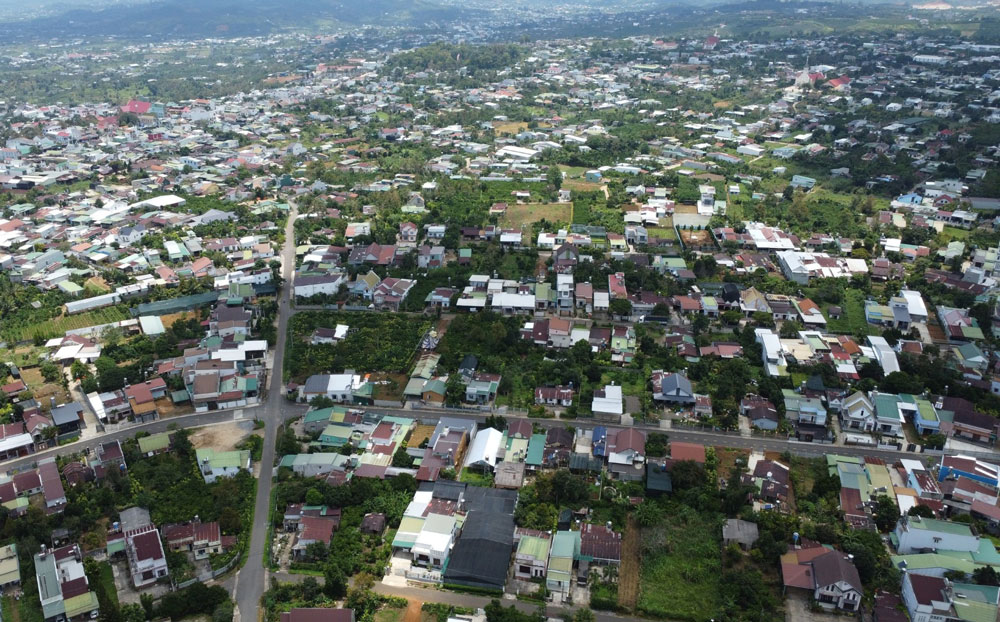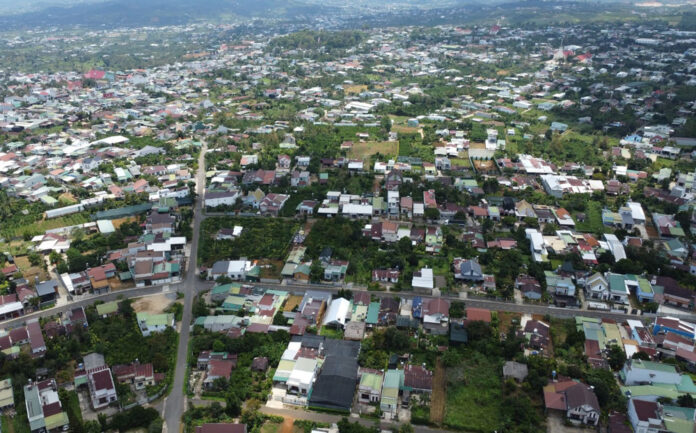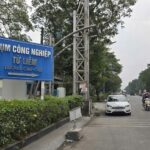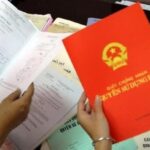On February 5, Nguoi Lao Dong Newspaper reported that the People’s Committee of Bao Loc City, Lam Dong Province, had issued a document instructing relevant units to research the contents related to the handling of land lot 171, sheet 9, Loc Tien Ward, covering an area of over 75,000 square meters.
Leasing Land Only to Leave It Unused
According to our sources, land lot 171 in Loc Tien Ward was state-owned land but was encroached upon by multiple individuals and subsequently transferred through informal agreements.
Initially, this plot of land was under the management of the People’s Committee of Loc Tien Commune (now Loc Tien Ward) as per the land-use map established in 1986 and later in 1995. The competent authorities of Lam Dong Province and Bao Loc City inspected and affirmed the origin of the land lot as state-owned land.
In 2003, the land was leased by the Lam Dong Provincial People’s Committee to the Lam Dong Construction Materials Company (now Lam Dong Minerals and Construction Materials Joint Stock Company) for a period of 20 years to be used as a waste dump. However, from the time of the lease until 2011, the company left the land unused, allowing it to be gradually encroached upon by multiple individuals. In 2012, when the company attempted to dump waste on the land, they were prevented from doing so by the encroachers.
According to the authorities, the long period of non-usage by the Lam Dong Construction Materials Company after leasing the land, coupled with a lack of management, resulted in encroachment, usage, and subsequent informal transfers of the land by citizens.

Loc Tien Ward, Bao Loc City, Lam Dong Province
The identified reasons for this situation include the lack of a compensation and clearance plan for households using the land after the leasing decision was made. As a result, households and individuals with land in the area continued to cultivate and manage the land, transferring it through informal agreements. Additionally, the lack of clear boundaries contributed to encroachment by adjacent landholders.
In 2019, the People’s Committee of Lam Dong Province issued a decision to revoke the lease of land lot 171 from the Lam Dong Minerals and Construction Materials Joint Stock Company and handed over the management of the land, measuring over 75,000 square meters, to the People’s Committee of Bao Loc City.
Disputes Arise
According to the verification conducted by the authorities of Bao Loc City, the state’s use of land lot 171 has been continuous. The encroaching households do not possess documents or evidence proving their land-use rights, and therefore, their informal transfers of the land are considered illegal.
However, during the transfer process, the recipients were aware that the land was state-owned and did not have land-use certificates, yet they agreed to the transfer. As a result, there were no indications of “fraudulent appropriation” in these transactions.
According to our records, there are approximately 20 households and individuals currently using the land in question. The land usage is quite complex, with unclear boundaries and disputes arising.
In 2020, the authorities recorded the frequent gatherings of several groups in the area, relating to land usage. This prompted the Loc Tien Ward People’s Committee to establish a task force to maintain a 24-hour presence in the area to prevent the emergence of security and order issues. Subsequently, some households submitted petitions requesting land-use certificates for the portion of land belonging to lot 171, but the People’s Committee of Bao Loc City temporarily refrained from considering these requests.
In terms of state management of this land lot, the People’s Committee of Bao Loc City has repeatedly instructed the Loc Tien Ward People’s Committee to inspect, verify, and handle violations by encroaching households in 2018, 2020, and 2021. However, as of July 2024, the Ward People’s Committee has not yet administered any administrative violations in these cases. As a consequence, the Chairman of the People’s Committee of Bao Loc City at that time, Mr. Nguyen Van Phuong, criticized the Loc Tien Ward People’s Committee for their delay in implementing the city leadership’s directives.
Up to the present, the competent authorities have recommended that the Chairman of the People’s Committee of Bao Loc City issue a document requesting the People’s Committee of Lam Dong Province to direct relevant units to survey the current status, determine boundaries, and make corrections to the land-use map in accordance with regulations for land lot 171 to facilitate the resolution of complaints.
Considering Management Accountability
The competent authorities of Lam Dong Province have recommended that the Chairman of the People’s Committee of Bao Loc City consider the responsibility of the Chairman, Vice Chairman, and officials in charge of land management of the Loc Tien Ward People’s Committee during the respective terms. This recommendation comes in light of their leadership and direction in implementing state management of land, which has resulted in illegal transfers of land-use rights, construction of houses and works on land belonging to lot 171, which is state-owned as per regulations.
At the time of verification by the competent authorities, the People’s Committee of Bao Loc City and the Loc Tien Ward People’s Committee had not handled any administrative violations related to the encroachment and usage of land lot 171, which is state-owned property.
The Penultimate Pen: Crafting a Captivating Headline
“Hanoi Inspectorate Requests Bac Tu Liem District to Review Collective and Individual Responsibilities.”
The Hanoi Inspectorate recommended that the City People’s Committee direct the Bac Tu Liem District People’s Committee to organize an inspection of collective and individual responsibilities regarding the management and use of land, construction order, and environmental protection at the Tu Liem Industrial Cluster.
The Intriguing Conundrum of Illegal Land Receiving Red Books: Unveiling the Mystery for the Public’s Awareness.
If you fall under any of the following four categories of land use violations that occurred before July 1, 2014, you may still be eligible for a red book consideration.
The Six Types of Behavior That Are Considered Stock Market Manipulation
The amended law introduces amendments to 9 existing laws, including the Securities Law, and outlines 6 types of behaviors that are considered market manipulation.





















